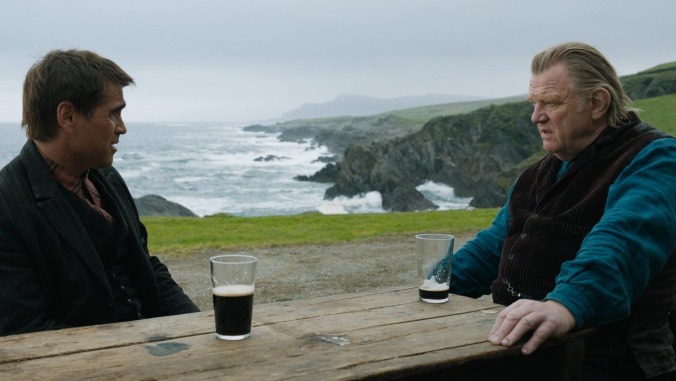How Martin McDonagh made a platonic breakup more devastating than any romantic split in The Banshees Of Inisherin
Oscar-winner Martin McDonagh on reuniting with Colin Farrell and Brendan Gleeson, the complexity of friendships, and the trouble with men

Cinematic synergy between filmmaker and muse abounds, but there may be no better combination of a director and two actors than Martin McDonagh and Colin Farrell and Brendan Gleeson. The co-stars channeled McDonagh’s trademark dark humor back in 2008 for In Bruges, and they do it again on a windswept, farm animal-filled Irish island in The Banshees Of Inisherin, co-starring Kerry Condon and Barry Keoghan. Farrell plays Pádraic, a simple man who is devastated to learn that Gleeson’s Colm, his best friend, is suddenly refusing to frequent the local pub with him on account of his being, well, “dull.” As McDonagh tells The A.V. Club, that initial revelation is the first of many that required the finest of fine-tuning for the dynamics between these two characters.
An Academy Award winner for the short film Six Shooter and a nominee for Three Billboards Outside Ebbing, Missouri (and partner to fellow British playwright-turned-screenwriter Phoebe Waller-Bridge), McDonagh excels at both conceiving and executing such dynamics. As he points out, platonic breakups aren’t often deemed worthy of an entire film’s plot; while The Banshees Of Inisherin might feel slight or silly at first glance, there’s an all-too-relatable world of hurt to explore. Read on for a peek behind McDonagh’s tragicomic curtain.
The A.V. Club: Colin Farrell and Brendan Gleeson create magic throughout The Banshees Of Inisherin, much like they did with In Bruges. How much was their casting integral to your writing process?
Martin McDonagh: One hundred percent. It was written for them. We always wanted to get back together in the last 14 years and remain friends and we’d see each other every year. And it was a hope but, you know, it was never going to come to fruition until I stopped being lazy and sat down and got on with it. And I tried a version maybe seven years ago which didn’t quite work, but the first five pages was just the break up part. And I went back to it, reread it, kept those five pages, but went to a completely different place for this screenplay. I threw away all the plot, basically, of the previous, and just let the sort of sadness of the breakup be what the film was about.
AVC: And what surprised you about working with these two actors again, on a scale between “like no time has passed” versus “starting from scratch?”
MM: It was very much the former, yeah. I felt like no time had passed and we just slipped into it. We had a couple of weeks of rehearsal, similar to what we had for In Bruges actually, and just slipped into it. Just back to being friends, going for dinners, discussing the scenes and the characters. There was an ease to it. Even the first day of filming, it was just like old friends hanging out really. And I think that kind of shows in the movie.
AVC: How important is the fact that these are two men going through this friend breakup? This film is set in the 1920s and coming out in 2022, and it struck me how little masculinity seems to have changed. Are men okay? I came away thinking men are not okay.
MM: I’d go along with that. [Laughs] Yeah, I think that’s probably true, sadly. But maybe if there’s more films like this, it will help. But I doubt it! Yeah, not speaking, not addressing one’s feelings, bearing grudges, all that stuff seems like it’s never going to go away. I try not to, but it’s still there in me too. I don’t know, I hope we are getting better as a species.
AVC: What fundamentally were you trying to unlock or understand about the friendship between these two characters?